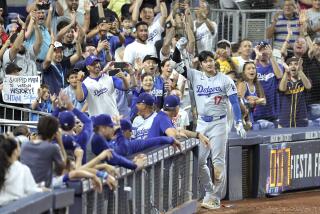Braves Not Used to Starting Slow
- Share via
ATLANTA — Brian Jordan stood at his locker after batting practice, trying to find a smidgen of hope in a most un-Braves-like start to the season.
“It’s time we had to deal with a little adversity,” the outfielder said. “Maybe this will make us even stronger when we come to the end of the season.”
He paused for effect, then added, “At least I hope it works out that way.”
The Braves are accustomed to sitting in first place, the regular season nothing more than a tuneup for their annual trip to the playoffs. They have been a part of every postseason since 1991--a record run of nine straight division titles.
All guarantees are off this year. Plagued by injuries and anemic hitting, not to mention a pitching staff that no longer dominates, the Braves stumbled through April with a 12-14 record, their first sub-.500 opening since 1993.
General manager John Schuerholz is quick to point out that the team bounced back from its slow start eight years ago to win 104 games, second-most in franchise history.
“I think most reasonable people with a good knowledge of baseball don’t put much credence in April records,” he said. “If there are some people that do, I guess they should look back at 1993, and feel pretty good about the way we’re playing this year.”
Of course, Schuerholz is hardly pleased with the first month’s performance. The Braves entered May hitting just .237 as a team and sporting a cumulative ERA of 4.29.
“No one here is satisfied,” the GM said. “But we also recognize that it’s only the first month.”
The warning signs were evident as far back as the last postseason, when the Braves were swept in the first round by the St. Louis Cardinals. Over the winter, the Braves were considered among the favorites to land either Alex Rodriguez or Mike Hampton--maybe both. They didn’t get either one, and wound up losing one of their most productive hitters, Andres Galarraga.
When spring training began, there already were grumbles among Atlanta fans about the lack of major moves. Then things got worse. John Smoltz felt pain in his reconstructed elbow and put his comeback from Tommy John surgery on hold. Reserve catcher Eddie Perez scuttled his comeback altogether for this year when his right shoulder required more surgery.
In addition, Jordan, second baseman Quilvio Veras and outfielder B.J. Surhoff were recuperating from operations. This was a team custom-made for a slow start.
“It’s too early to worry,” Jordan said. “We’ve just got to be patient and let it come. It will. There’s no doubt in my mind it will. We’re too good a team to play like this.”
On the other hand, the Braves hardly appear to be a dominating team--especially on offense. Except for the Joneses--Chipper and Andruw--there are no intimidating hitters in the lineup.
Surhoff was hitting under .200--yet actually found himself in the cleanup spot for a few games. Veras was putting up similar numbers, hampered by injury and illness.
Javy Lopez was struggling. So was Rafael Furcal, last year’s NL rookie of the year who was supposed to be a catalyst at the top of the batting order. Newcomer Rico Brogna cooled off significantly after a torrid debut.
The Braves showed signs of breaking out during a 10-game road trip, which included stops at hitter-friendly parks in Houston and Arizona. But they managed four runs in their first two games back home, bringing their Turner Field total to 27 runs in 11 contests.
“I think this ballclub is put together really well for this ballpark,” said batting coach Merv Rettenmund, referring to the longstanding emphasis on pitching. “If you put us in Colorado or Houston or Arizona, we would definitely have to strengthen the middle of the lineup.”
Any team with Greg Maddux and Tom Glavine has to be considered one of the better-armed teams in the game, but the Braves don’t have a dominating rotation from top to bottom as they did through much of the 1990s.
Not yet anyway.
Smoltz, who hasn’t pitched in a real game since the 1999 World Series, hopes to rejoin the rotation in a couple of weeks, after rehabbing in the minors. There’s no guarantee he will be the same pitcher he was before surgery.
“I’m not going to come back from this thing right out of the gates,” Smoltz conceded.
Then there’s the bullpen, where closer John Rocker still displays the inconsistency that plagued him through much of his tumultuous 2000 season. He can be dominating one night, shaky the next.
And the Braves have lost some key personalities in the clubhouse over the past two seasons.
Ozzie Guillen kept teammates laughing. Galarraga was a quiet leader, especially popular with the team’s large Latin contingent. Perez is one of the more vocal players, but he can’t have the same impact from the sidelines.
“They kept us loose, kept us going,” Jordan said. “They are missed.”
Attendance has fallen off noticeably this season--no sellouts and six crowds of fewer than 30,000 in the first 11 games. Instead, the fans seem content to watch on television and bash the Braves through talk shows and other media, even needling the team for winning just one World Series title over the last decade.
“Basically, they’re spoiled,” Jordan said. “They’re used to the Braves winning, winning, winning.”
It’s much too early to proclaim an end to the dynasty. The NL East hardly shapes up as a powerhouse division, with Philadelphia off to a surprising start but no one else--including the NL champion New York Mets--above .500 heading to the weekend.
“It’s probably going to be us or the Mets,” Rettenmund said. “It’s a long, long season.”
More to Read
Go beyond the scoreboard
Get the latest on L.A.'s teams in the daily Sports Report newsletter.
You may occasionally receive promotional content from the Los Angeles Times.










